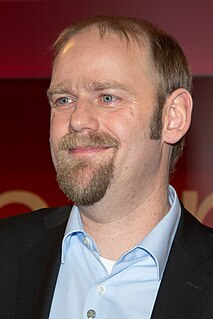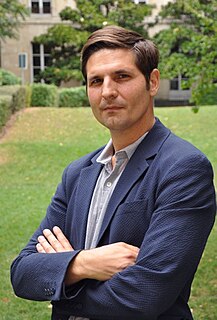Related Research Articles
The term Homo economicus, or economic man, is the portrayal of humans as agents who are consistently rational and narrowly self-interested, and who pursue their subjectively defined ends optimally. It is a word play on Homo sapiens, used in some economic theories and in pedagogy.
Neuroeconomics is an interdisciplinary field that seeks to explain human decision making, the ability to process multiple alternatives and to follow through on a plan of action. It studies how economic behavior can shape our understanding of the brain, and how neuroscientific discoveries can guide models of economics.
In cultural anthropology, reciprocity refers to the non-market exchange of goods or labour ranging from direct barter to forms of gift exchange where a return is eventually expected as in the exchange of birthday gifts. It is thus distinct from the true gift, where no return is expected.
The dictator game is a popular experimental instrument in social psychology and economics, a derivative of the ultimatum game. The term "game" is a misnomer because it captures a decision by a single player: to send money to another or not. Thus, the dictator has the most power and holds the preferred position in this “game.” Although the “dictator” has the most power and presents a take it or leave it offer, the game has mixed results based on different behavioral attributes. The results – where most "dictators" choose to send money – evidence the role of fairness and norms in economic behavior, and undermine the assumption of narrow self-interest when given the opportunity to maximise one's own profits.
Personnel economics has been defined as "the application of economic and mathematical approaches and econometric and statistical methods to traditional questions in human resources management". It is an area of applied micro labor economics, but there are a few key distinctions. One distinction, not always clearcut, is that studies in personnel economics deal with the personnel management within firms, and thus internal labor markets, while those in labor economics deal with labor markets as such, whether external or internal. In addition, personnel economics deals with issues related to both managerial-supervisory and non-supervisory workers.
Homo reciprocans, or reciprocating human, is the concept in some economic theories of humans as cooperative actors who are motivated by improving their environment through positive reciprocity or negative reciprocity, even in situations without foreseeable benefit for themselves.
Marianne Bertrand is a Belgian economist who currently works as Chris P. Dialynas Professor of Economics at the University of Chicago's Booth School of Business. Bertrand belongs to the world's most prominent labour economists in terms of research, which has been awarded the 2004 Elaine Bennett Research Prize and the 2012 Sherwin Rosen Prize for Outstanding Contributions in the Field of Labor Economics.She is a research fellow of the National Bureau of Economic Research, and the IZA Institute of Labor Economics.
Joseph Gerard Altonji is an American labour economist and the Thomas DeWitt Cuyler Professor of Economics at Yale University. His fields of interest include macroeconomics and applied econometrics and in particular labour economics, being ranked as one of the foremost labour economists worldwide. In 2018, his contributions to the analysis of labour supply, family economics and discrimination were rewarded with the IZA Prize in Labor Economics.

Ludger Wößmann is a German economist and professor of economics at the Ludwig Maximilian University of Munich (LMU). Moreover, being one of the world's foremost education economists, he is the director of the ifo Center for the Economics of Education at the ifo Institute. Beyond the economics of education, his research interests also include economic growth and economic history. In 2014, Wößmann's empirical research on the effects of education and his corresponding contribution to public debate were awarded the Gossen Prize, followed by the Gustav Stolper Prize in 2017.
Victor Chaim Lavy is an Israeli economist and professor at the University of Warwick and the Hebrew University of Jerusalem. His research interests include labour economics, the economics of education, and development economics. Lavy belongs to the most prominent education economists in the world.
Mark Richard Rosenzweig is an economist and the Frank Altschul Professor of International Economics at Yale University, where he also directs the Economic Growth Center. Rosenzweig belongs to the world's most prominent agricultural and development economists, and is one of the leading scholars on the subjects of the economics of insurance and migration.
Giorgio Brunello is an Italian economist and Professor of Economics at the University of Padova. His research interests include education, migration, training, unemployment and wages. He ranks among the foremost labour economists in Italy.

Jan C. van Ours is a Dutch economist and currently Professor of Applied Economics at the Erasmus University Rotterdam (EUR). He belongs to the most highly cited economists in the Netherlands and is the 1996 winner of the Hicks-Tinbergen Award.
Shelly J. Lundberg is an economist and currently holds the positions of Leonard Broom Professor of Demography at the University of California, Santa Barbara, where she serves as Associate Director of the Broom Center for Demography. Lundberg is one of the world's leading population economists.

Yann Algan is a French economist, Associate Dean of Pre-experience Programs and Professor of Economics at HEC Paris. He was previously and until 2021 a Professor of Economics of Sciences Po, where he was dean of the School of Public Affairs. His research interests include the digital economy, social capital and well-being. In 2009, Yann Algan was awarded the Prize of the Best Young Economist of France for his contributions to economics in France.

Pierre Cahuc is a French economist who currently works as Professor of Economics at Sciences Po. He is Program Director for the IZA Institute of Labor Economics's programme "Labour Markets" and research fellow at CEPR. His research focuses mainly on labour economics and its relationship with macroeconomics. In 2001, he was awarded the Prize of the Best Young Economist of France for his contributions to economic research. He belongs to the most highly cited economists in France and Europe's leading labour economists.
Klaus M. Schmidt is a German economist who currently works as Professor of Economics at the University of Munich (LMU). His research focuses on behavioural economics, game theory and contract theory. In 2001, Schmidt was awarded the Gossen Prize in recognition for his contributions to economic research on game theory, contract theory, and the economics of fairness. He is a member of the council for the Lindau Nobel Laureate Meetings.
Lisa Cameron is an Australian economist currently working as a Professional Research Fellow at the Melbourne Institute of Applied Economic and Social Research at the University of Melbourne.
Frédéric Docquier is a Belgian economist and Professor of Economics at the Catholic University of Louvain (UCLouvain). He ranks as one of the leading economists in the field of international migration, with a focus on brain drain and skilled migration.
Lorraine Margaret Dearden is an Australo-British economist and professor of economics and social statistics at the Department of Social Science of the Institute of Education, University College London. Her research focuses on the economics of education.
References
- ↑ Curriculum Vitae of Uwe Sunde from the website of the LMU (status: January 2018). Retrieved March 18th, 2018.
- ↑ Webpage of Uwe Sunde on the website of the LMU. Retrieved March 18th, 2018.
- ↑ Curriculum vitae of Uwe Sunde on the website of the LMU (status: January 2018). Retrieved March 18th, 2018.
- ↑ "IZA Fellow Uwe Sunde wins prestigious Gossen Prize | IZA Newsroom". newsroom.iza.org. Retrieved 2018-03-18.
- ↑ Curriculum vitae of Uwe Sunde on the website of the LMU (status: January 2018). Retrieved March 18th, 2018.
- ↑ Ranking of economists registered on IDEAS/RePEc. Retrieved March 18th, 2018.
- ↑ Bonin, H. et al. (2007). Cross-sectional earnings risk and occupational sorting: The role of risk attitudes. Labour Economics, 14(6), pp. 926–937.
- ↑ Dohmen, T. et al. (2010). Are Risk Aversion and Impatience Related to Cognitive Ability? American Economic Review, 100(3), pp. 1238-1260.
- ↑ Jaeger, D.A. et al. (2010). Direct evidence on risk attitudes and migration. Review of Economics and Statistics, 92(3), pp. 684–689.
- ↑ Dohmen, T. et al. (2011). The intergenerational transmission of risk and trust attitudes. Review of Economic Studies, 79(2), pp. 645–677.
- ↑ Dohmen, T. et al. (2011). Individual Risk Attitudes: Measurement, Determinants, and Behavioral Consequences. Journal of the European Economic Association, 9(3), pp. 522-550.
- ↑ Fliessbach, K. et al. (2007). Social comparison affects reward-related brain activity in the human ventral striatum. Science 318(5854), pp. 1305–1308.
- ↑ Dohmen, T. et al. (2011). Relative versus absolute income, joy of winning, and gender: Brain imaging evidence. Journal of Public Economics, 95(3-4), pp. 279–285.
- ↑ Dohmen, T. et al. (2008). Representative trust and reciprocity: Prevalence and determinants. Economic Inquiry, 46(1), pp. 84–90.
- ↑ Dohmen, T. et al. (2009). Homo reciprocans: Survey evidence on behavioural outcomes. Economic Journal, 119(536), pp. 592–612.
- ↑ Cervellati, M., Sunde, U. (2005). Human capital formation, life expectancy, and the process of development. American Economic Review, 95(5), pp. 1653–1672.
- ↑ Cervellati, M., Sunde, U. (2011). Life expectancy and economic growth: the role of the demographic transition. Journal of Economic Growth, 16(2), pp. 99–133.